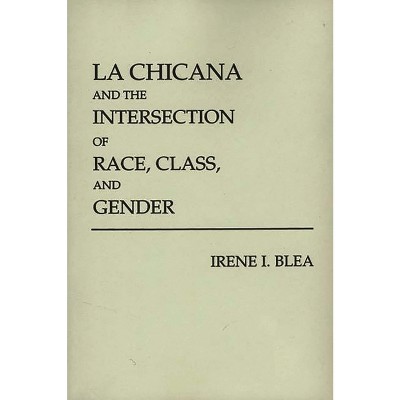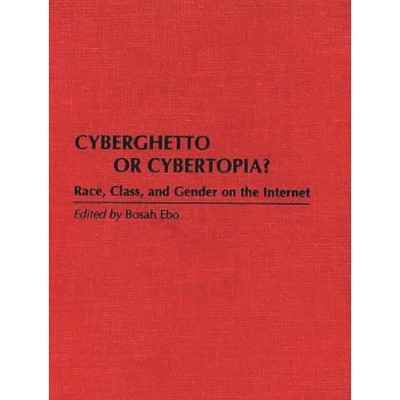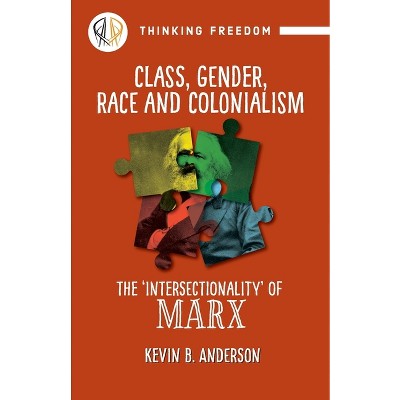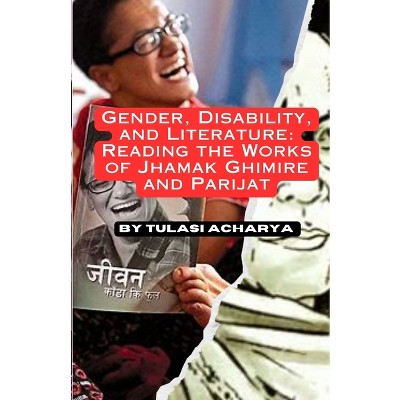Sponsored

La Chicana and the Intersection of Race, Class, and Gender - (Literature; 40) by Irene Blea (Hardcover)
In Stock
Sponsored
About this item
Highlights
- In this study, Irene I. Blea describes the social situation of La Chicana, a minority female whose life is influenced by racism and sexism.
- About the Author: IRENE I. BLEA is Director of Hispanic Student Services at the University of New Mexico in Albuquerque.
- 192 Pages
- Social Science, Discrimination & Race Relations
- Series Name: Literature; 40
Description
About the Book
In this study, Irene I. Blea describes the social situation of La Chicana, a minority female whose life is influenced by racism and sexism. Blea analyzes contemporary scholarship on race, class, and gender, scrutinizing the use of language and labels to examine how La Chicana is affected by these factors. The wide-ranging study explores the history of Chicanas and the meaning of the term Chicana, and considers her socialization process, the consequences of deviating from gender roles, and the evolution of Hispanic women onto the national scene in politics, health, economics, education, religion, and criminal justice. To date, little attention has been paid to the political, social, and cultural achievements of La Chicana. The shared lives of Mexican-American women and men at home and inside and outside of the barrio are also investigated. This unique volume highlights the variables that effectively discriminate against women of color.
Following a chapter that reviews the literature on Chicanas and focuses on their participation in three major social movements, the text discusses the conquest of Mexico and the blending of Aztec and Spanish cultures. Next, the life of colonial Hispanic women in Mexico and the United States and the role of the Mexican War in shaping the Mexican-American experience are investigated. The following three chapters explore how Americanization disempowered La Chicana; discuss the contemporary cultural roles of la mujer (woman) and their impact on men's roles; and consider the lives of older women. Chapter Seven looks at how some women are defining new roles for La Chicana. Current social issues are compared with and contrasted to those of the 1960s. The final chapters develop a theory of discrimination based on the academic work of racial and ethnic minority scholars and feminist scholars, exploring new directions in the study of Chicanas. This volume is valuable as an undergraduate or graduate text, and as a reference work, as well as a useful resource for social service providers.
Book Synopsis
In this study, Irene I. Blea describes the social situation of La Chicana, a minority female whose life is influenced by racism and sexism. Blea analyzes contemporary scholarship on race, class, and gender, scrutinizing the use of language and labels to examine how La Chicana is affected by these factors. The wide-ranging study explores the history of Chicanas and the meaning of the term Chicana, and considers her socialization process, the consequences of deviating from gender roles, and the evolution of Hispanic women onto the national scene in politics, health, economics, education, religion, and criminal justice. To date, little attention has been paid to the political, social, and cultural achievements of La Chicana. The shared lives of Mexican-American women and men at home and inside and outside of the barrio are also investigated. This unique volume highlights the variables that effectively discriminate against women of color.
Following a chapter that reviews the literature on Chicanas and focuses on their participation in three major social movements, the text discusses the conquest of Mexico and the blending of Aztec and Spanish cultures. Next, the life of colonial Hispanic women in Mexico and the United States and the role of the Mexican War in shaping the Mexican-American experience are investigated. The following three chapters explore how Americanization disempowered La Chicana; discuss the contemporary cultural roles of la mujer (woman) and their impact on men's roles; and consider the lives of older women. Chapter Seven looks at how some women are defining new roles for La Chicana. Current social issues are compared with and contrasted to those of the 1960s. The final chapters develop a theory of discrimination based on the academic work of racial and ethnic minority scholars and feminist scholars, exploring new directions in the study of Chicanas. This volume is valuable as an undergraduate or graduate text, and as a reference work, as well as a useful resource for social service providers.Review Quotes
?Blea's political position deserves the respect of the Chicano intellectual community and provides the underlying theme of most of her work. This most recent book reflects Blea's commitment to a Chicano feminism. Blea, author of Toward a Chicano Social Science (CH, Mar' 89), provides the reader with a good introduction to many of the social issues affecting Chicano women today (e.g., teen pregnancy, high fertility rates, role of older women, poverty, school dropouts). Particularly appealing is the author's emphasis on historical events and figures, e.g., Blea's discussion of the role of the Adelitas during the Mexican revolution and of the intellectual legacy of Sor Juana Ines de la Cruz and that of other noted Mexican and Chicano women. Although Blea does an excellent job in bringing to the surface important issues that have been either ignored or not significantly addressed in the social science literature (e.g., violence in humor, dated paradigms, lesbians), she analyzes these issues only superficially. Other minor--but irksome--details are the spelling of the Spanish Dolores as Delores, and the datedness of many of the references. The latter shortcoming is particularly important when discussing contemporary concerns such as health, the elderly, and crime. In sum, the book is recommended as an introduction to the broader topic of Chicano culture and social reality, and to the somewhat narrower topic of Chicano women.?-Choice
"Blea's political position deserves the respect of the Chicano intellectual community and provides the underlying theme of most of her work. This most recent book reflects Blea's commitment to a Chicano feminism. Blea, author of Toward a Chicano Social Science (CH, Mar' 89), provides the reader with a good introduction to many of the social issues affecting Chicano women today (e.g., teen pregnancy, high fertility rates, role of older women, poverty, school dropouts). Particularly appealing is the author's emphasis on historical events and figures, e.g., Blea's discussion of the role of the Adelitas during the Mexican revolution and of the intellectual legacy of Sor Juana Ines de la Cruz and that of other noted Mexican and Chicano women. Although Blea does an excellent job in bringing to the surface important issues that have been either ignored or not significantly addressed in the social science literature (e.g., violence in humor, dated paradigms, lesbians), she analyzes these issues only superficially. Other minor--but irksome--details are the spelling of the Spanish Dolores as Delores, and the datedness of many of the references. The latter shortcoming is particularly important when discussing contemporary concerns such as health, the elderly, and crime. In sum, the book is recommended as an introduction to the broader topic of Chicano culture and social reality, and to the somewhat narrower topic of Chicano women."-Choice
About the Author
IRENE I. BLEA is Director of Hispanic Student Services at the University of New Mexico in Albuquerque. Before she accepted this administrative position, she was a full professor at Metropolitan State College in Denver for eleven years. Her publications include Toward a Chicano Social Science (Praeger, 1988)
ssemer: A Sociological Perspective of a Chicano Barrio play and numerous poems.Shipping details
Return details
Trending Non-Fiction











